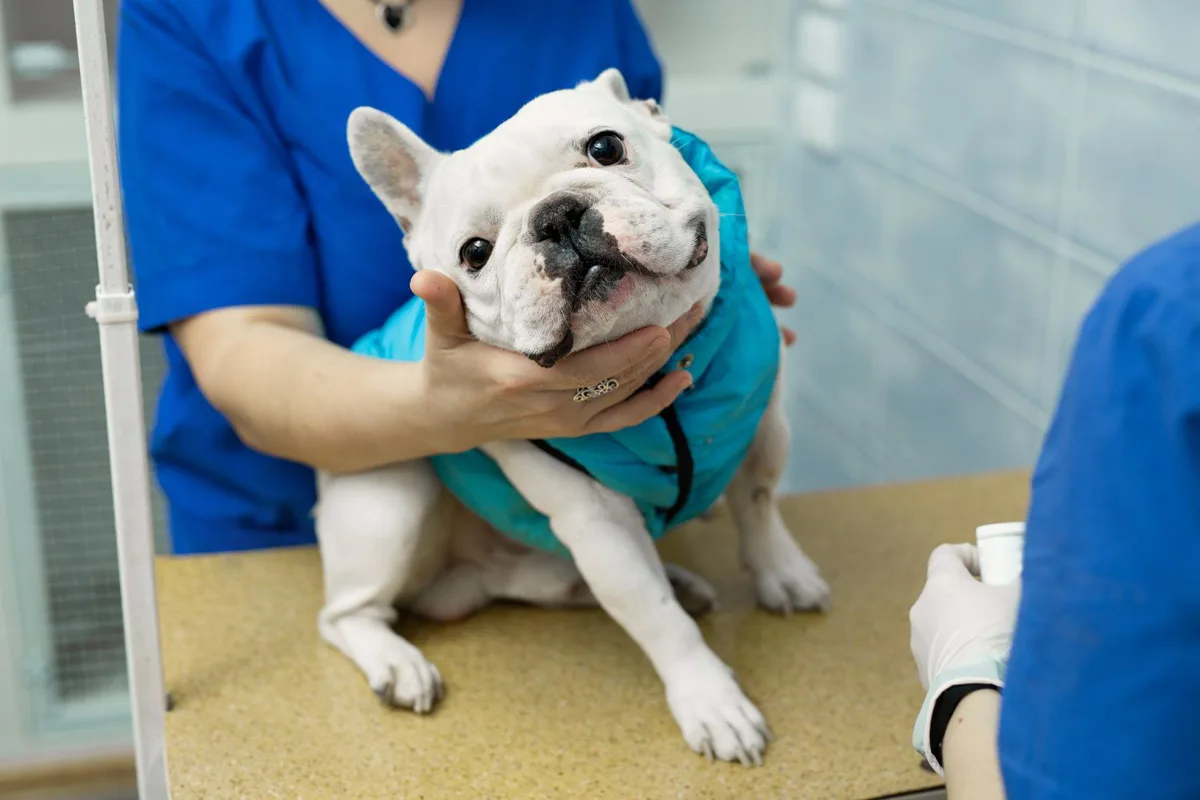When our dogs show any signs of sickness, it’s only natural for us to worry. They are, after all, cherished members of our families. As sickness can spread like wildfire through a home, one question that has made rounds among concerned dog owners is: “can dogs get mono?”
While many of us are familiar with mononucleosis in humans, we’ll look into if and how it affects our dogs.

Understanding mononucleosis (mono)
Before diving into the implications of mono for dogs, it’s worth defining what mono is.
Mononucleosis, often termed “mono” and colloquially dubbed the “kissing disease,” is a viral illness caused predominantly by the Epstein-Barr virus (EBV) in humans.
Mono is characterized by fatigue, sore throat, fever, swollen lymph nodes and sometimes an enlarged spleen in humans. Typically, it’s transmitted via saliva, hence its nickname. Because of this, you can see why it can be a big concern to our furry friends that often enjoy licking our face if we let them.
Mono and dogs
In short, dogs do not get mono in the way humans do. Specifically, the mononucleosis virus has not been shown to be passed from humans to dogs. While dogs and humans share a variety of health concerns, viral infections are often species-specific.
This specificity means that many viruses tend to infect only one species or closely related species and won’t jump from humans to dogs or vice versa.
Should we be concerned about dogs getting mono?
Epstein–Barr virus is a widespread gammaherpesvirus in the human population, with over 90 % of adults being seropositive for the virus (Henle et al., 1969). EBV can cause infectious mononucleosis.
Studies, such as University of Pennsylvania’s published in Science Direct, have not only found EBV infection in dogs but also linked the infection to lymphoma in our pet companions as well.
The confusion or concern often arises when a dog displays symptoms that could be associated with mono if observed in humans: fatigue, lack of appetite or swollen lymph nodes. However, these symptoms in dogs can be indicative of numerous other conditions, infections or diseases, which is why it’s essential to approach canine health by recognizing species-specific conditions.

Common dog illnesses with overlapping symptoms
A few illnesses in dogs might present symptoms that overlap with those of mono:
- Canine Infectious Respiratory Disease (CIRD): Often referred to as “kennel cough,” this is a complex multi-factorial disease causing coughing, sneezing and sometimes fever.
- Lymphoma: This is a type of cancer that affects the lymph nodes and can cause swelling, similar to the swollen lymph nodes seen in humans with mono.
- Canine Ehrlichiosis: A tick-borne disease that can result in symptoms like fatigue, lack of appetite and swollen lymph nodes.
If your dog exhibits any concerning symptoms, it’s crucial to consult a veterinarian. While the internet and articles like these can provide some insight, it’s no substitute for professional medical advice tailored to your dog’s unique situation.
Protecting your canine companion
The key takeaway here isn’t just that dogs don’t get mono, but that dog owners should be informed about species-specific illnesses. Here are some proactive steps to ensure your dog’s health:
Regular Vet Check-ups: Annual or semi-annual visits can catch potential health issues early.
Vaccinations: Speak with your vet and come up with a mutually agreed upon plan regarding vaccinations that make sense for your dog. Some common illnesses that can be vaccinated against include:
- Canine Distemper: A viral disease that affects a dog’s respiratory, gastrointestinal, respiratory and central nervous systems, as well as the conjunctival membranes of the eye.
- Rabies: A deadly disease caused by a virus that affects the brain. It’s transmitted through the bite of an infected animal. Vaccination is essential and is mandated by law in many regions.
- Kennel Cough (Bordetella): An infectious bronchitis that can be caused by both viral and bacterial agents. It’s highly contagious and is characterized by a persistent cough. Many boarding kennels will refuse admittance without this vaccination.
- Canine Influenza: A respiratory infection that can cause coughing, sneezing and in severe cases, pneumonia.
- Leptospirosis: A bacterial disease that affects a dog’s kidney and liver. It’s transmitted through the urine of infected animals and can be contracted by humans as well.

Preventative Care: This includes regular flea and tick treatments and heartworm prevention. Heartworm disease is caused by a parasitic worm residing in the heart and adjacent large blood vessels. It’s transmitted through mosquito bites.
Awareness: Stay updated on common canine diseases and conditions. Some of these include:
- Lyme Disease: A tick-borne illness that can cause symptoms like fever, lameness, swollen joints and lethargy.
- Hip Dysplasia: A genetic condition where the hip joint doesn’t develop properly, leading to arthritis and pain. This condition was common in working dogs such as the German Shepherd. However, over the past couple of decades it has declined with the adoption of the belgian malinois police dog.
- Canine Diabetes: Similar to human diabetes, it involves issues with insulin production and processing and why offering your dog species appropriate food and portions is important.
- Ear Infections: Often caused by bacteria, ear mites, yeast or hair growth in the ear canal.
- Dental Disease: Gingivitis or periodontitis can develop from untreated dental issues.
Being informed allows you to spot unusual symptoms quickly. Regular vet check-ups and a proper diet and exercise regime can help in preventing many of these diseases. If your dog displays any unusual symptoms, always consult with a veterinarian. Early detection and treatment can make a significant difference in the prognosis for many of these conditions.
In Conclusion
Dogs might be our best friends, but they are not miniature humans. Their health concerns, while sometimes sounding familiar, are often distinct.
While dogs cannot get mono from humans or experience it in the way we understand the disease, they have their own set of health challenges. Prioritizing their health, staying informed and taking prompt action when they’re unwell ensures that our furry friends live long, happy lives by our sides.

